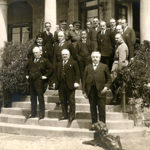Published January 25, 2011
By all accounts, President Barack Obama will refocus in his 2011 State of the Union address on “jobs and competitiveness.” One must hope he succeeds. But Treasury Secretary Timothy Geithner’s previews strongly suggest that both men are unaware that these two problems are essentially unrelated, and that even with continued economic recovery, Obama won’t propose the two measures that would cut unemployment sharply and start to reverse the decline of U.S. manufacturing: reversing recent extensions of unemployment benefits from 26 to 99 weeks, and negotiating the end of the dollar’s role as chief official reserve currency. Geithner regards the first as “stimulus” and the second as unthinkable.
As the chart below shows, the decline in the U.S. overall net investment position by 30% of GDP almost exactly matched the decline in U.S. net monetary reserves (U.S. foreign official assets minus liabilities). Yet by the latest figures, U.S. net private assets were in surplus by about 7% of GDP. This proves that the U.S. loss of competitiveness is entirely due to financing Federal deficits through foreign monetary authorities. The next successful U.S. president will implement both reforms.
John D. Mueller is the Lehrman Institute Fellow in Economics at the Ethics and Public Policy Center.












